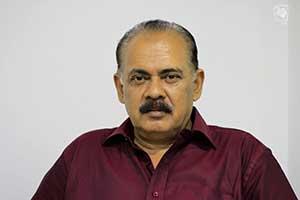'He will go to any extent, and he will have the full support of the Union government as they may not like a Left government to continue here.'

The stand-off between Arif Mohammad Khan, the governor of Kerala, and the Left Democratic Front government led by Chief Minister Pinarayi Vijayan, escalated on Monday, November 7, 2022.
The current battle with the governor -- in his role as chancellor -- wanting to sack the vice chancellors of several universities in the state, then asking Vijayan to sack his finance minister for remarks he made about Khan.
On Monday, Khan alleged that a system of 'oligarchy' prevails in the Communist Party of India-Marxist-ruled state, and it was evident from the incidents of party cadres being appointed in government jobs.
Dr Sebastian Paul, the former member of Parliament from Ernakulam, says the stand-off between the governor and the state government could lead to a Constitutional crisis in the state.
"The governor will dissociate himself from the finance minister which means the files coming from his office will not be passed by the governor. Then, the government will come to a standstill as the finance ministry is a very important ministry. Then the governor can report the matter to the President that there is a breakdown of the Constitutional machinery. Article 356 empowers the President to intervene," Dr Paul tells Rediff.com's Shobha Warrier in the second part of the interview.
It was reported that the governor would seek the Centre's help in this matter. What can the Centre do?
He can definitely do so as the governor, in our Constitutional scheme of things, is a representative of the Union government or the President in a state.
So, he will always seek the assistance or help of the Union government or the President, to be more precise.
If the governor remains adamant, there will arise a very serious problem.
The governor will dissociate himself from the finance minister which means the files coming from his office will not be passed by the governor. Then, the government will come to a standstill as the finance ministry is a very important ministry.
Then the governor can report the matter to the President that there is a breakdown of the Constitutional machinery. Article 356 empowers the President to intervene.
You mean, this can lead to a situation where the Centre can use Article 356?
Yes, it can.
Arif Mohammad Khan is a great fighter. He will go to any extent, and he will have the full support of the Union government as they may not like a Left government to continue here. So, anything can happen.
It means the entire matter can reach the Supreme Court. It is a very unprecedented situation. There are already many court judgments, but the Supreme Court has to redefine what is meant by 'pleasure' of the governor.
The LDF says the governor is trying to impose the ideology of the RSS and the BJP in Kerala. Do you think so?
Taking control over the universities is an important matter. Here, the governor is interfering in 11 universities.
The fate of eleven vice chancellors is hanging. If they have to go out, the governor, in his capacity as the chancellor, will have to fill up those vacancies. Not just one or two, 11 vacancies.
Who will he appoint? He will appoint persons of his choice. Persons of his choice means those with the RSS leaning.
So, in a way, it is a measure not only to appoint new VCs, but getting control over academic matters, education, university affairs, etc.
We are seeing how the RSS and the BJP is manipulating other universities where they have the political power. It will happen in Kerala also and it is a dangerous situation.
Do you think sending show cause notices to 11 vice chancellors and asking them to resign, etc is a planned move?
Yes, it is a very planned and articulated move to do certain things which they cannot do in normal circumstances.
By controlling the universities, they can control the entire academic activities in the state.
The governor is at loggerheads with the council of ministers and the move against (Kerala Finance Minister Kalanjoor Narayana) Balagopal is only a beginning.
In the governor's list, there are other ministers also. At least three. So, it will not end with one minister.
The easier way for the governor is to say that he has lost faith in the chief minister. Then, he can finish everything in one stroke.
 IMAGE: Dr Sebastian Paul. Photograph: Kind courtesy Dr Sebastian Paul
IMAGE: Dr Sebastian Paul. Photograph: Kind courtesy Dr Sebastian PaulIs a governor asking so many vice chancellors to resign, unprecedented?
Yes, it is. The problem is the recommendation made by the search committee which was not an intentional or planned thing.
It all started with the appointment of M S Rajashree as vice chancellor of the A P J Abdul Kalam Technical University.
The very same person in his capacity as the chancellor had signed the appointment order which was challenged in the high court.
A division bench -- which means three judges 00 upheld the appointment. But the Supreme Court took a different view.
With that judgment in hand, the governor now says that by virtue of that judgment, all the other appointments have become invalid.
The Kerala University Law Reforms Commission had recommended trimming the chancellor's powers. Can the state government do it?
The governor is the chancellor only because of the University Act. And the University Act is passed by the state legislature, of course in good intention.
You must understand that this is not the case in all the states, even in BJP-ruled states. When the same problem occurred in those states earlier, they had decided to avoid the governor in the academic scene.
Here also, the state legislature can amend the Act and make some other eminent person as the chancellor.
At one point, even Arif Mohammad Khan had said that he was not interested in remaining chancellor.
So, will the government amend the Act now?
The problem is that the legislature is not in session now; it will be in session only in January end. So, the government will be forced to bring an ordinance. But then the ordinance will have to be signed by the governor.
I don't think the governor will easily sign the ordinance depriving him of the position of the chancellor of the universities.
In the past, we have had many instances of the Centre using Article 356 against states ruled by opposing parties.
Do you think the tussle between governors and the state governments ruled by Opposition parties has increased now, and the governors have become more vocal?
I would say it is not the fault of the BJP alone and we cannot say that the BJP alone is responsible for the tussle.
When the Congress was in power at the Centre too, they were using the governor's position for their political ends.
The first victim was the Communist government in Kerala way back in 1959. It was none other than Nehru who used Article 356 to dismiss a popularly elected government here.
From 1967 onwards, there was tussle between the Centre and the state governments that were not in agreement with the Congress party. Then also, the governor was used as a weapon.
That's why the Supreme Court has been able to make so many judgments defining the power of the governor.
In my opinion, Arif Mohammad Khan is crossing the limits now.
- PART III: 'Problem is not with the Constitution'
Feature Presentation: Ashish Narsale/Rediff.com











 © 2025
© 2025